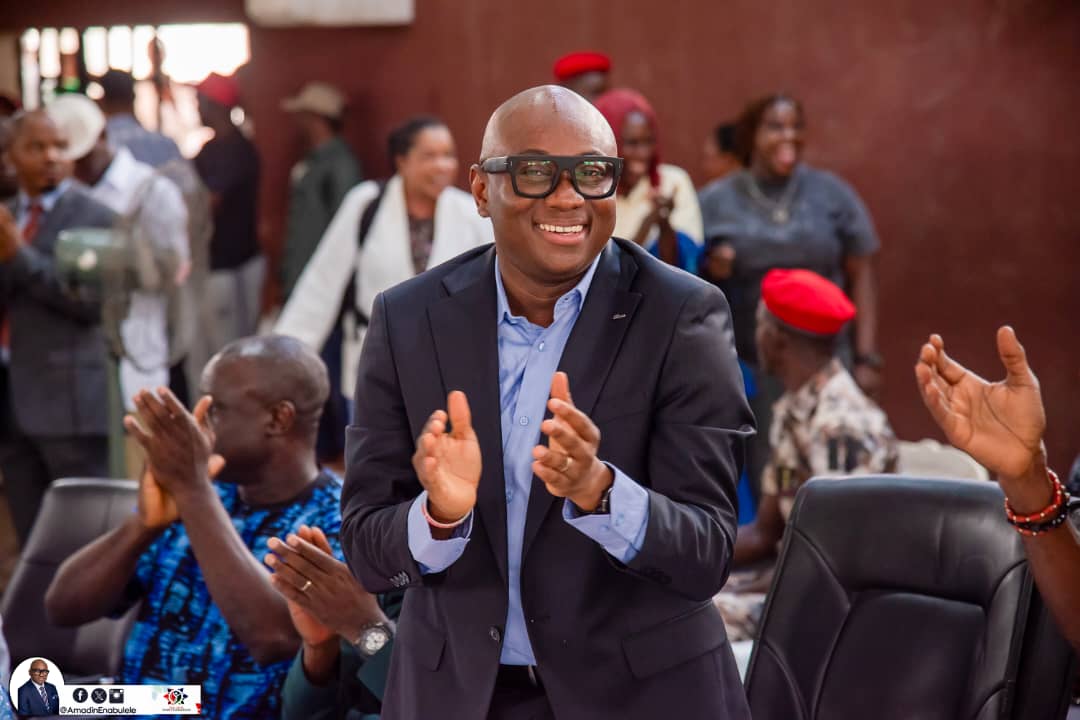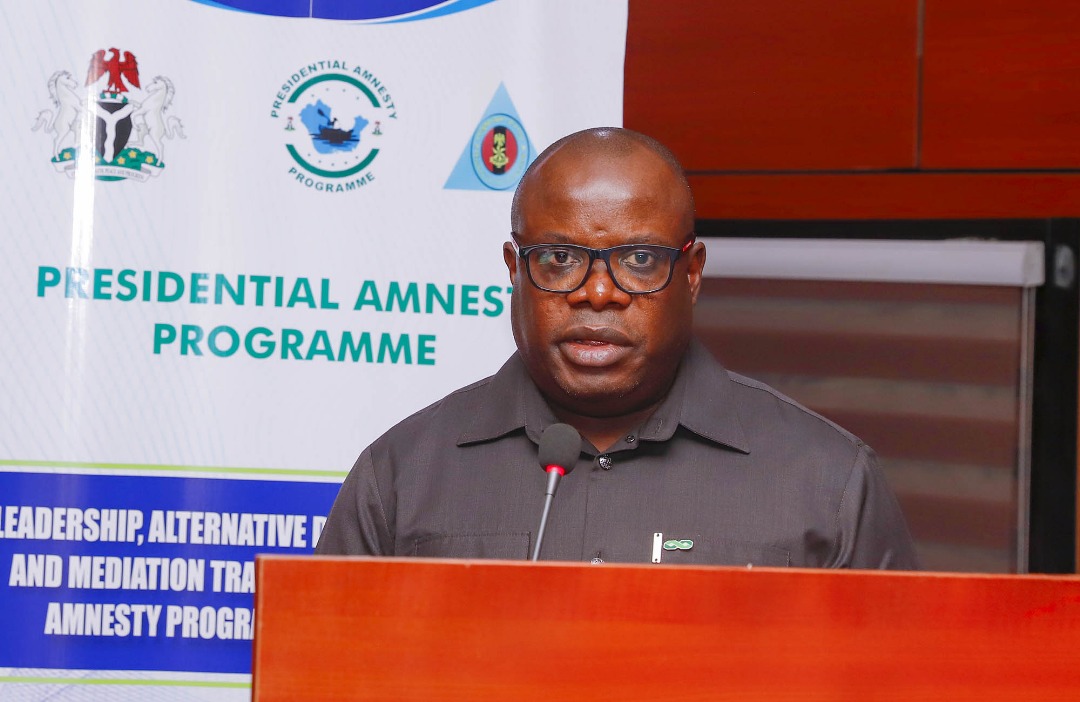News
It’s Baseless; Writers Faceless, Group Reacts To Petition Against PAP Administrator, Otuaro

By Joseph Ebi Kanjo
A group known as Ijaw People’s Development Initiative (IPDI) has described as baseless petition against the Administrator of Presidential Amnesty Programme (PAP) Dr. Dennis Otuaro by a group the IPDI described as ‘faceless.’
A group which identified itself as Niger Delta Liberators and Ex-Agitators Forum (NDLEF) had written a petition to the Economic and Financial Crimes Commission (EFCC) wherein it called for the investigation of the PAP Administrator.
The petition signed by one Jude Gbaboyor was published by some national dailies.
Reacting to the petition in a statement signed by the IPDI president, Comrade Austin Ozobo, the IPDI described the group led by Gbaboyor as illegal, arguing that it doesn’t have the moral and legal rights to petition against Otuaro.
READ ALSO: PAP: IPDI Tackles Group Over Attack On Otuaro
Ozobo added that besides that, the PAP Administrator does not have sketelon in his cupboard that should warrant EFCC investigation, adding that he was appointed on merit.
Ozobo argued that the petition was an attempt to distract Otuaro from carrying out his job and reforming the PAP, insisting that Otuaro has done nothing wrong.
“To set the record straight, Otuaro’s appointments were based on merit and not to suit any particular interest.
“The latest empty petitions and propaganda were attempts to distract Otuaro from his mission to reform and reposition the PAP. Every well meaning leader, youth and stakeholder of the Niger Delta must stand against the detractors who are pursuing personal interests.
READ ALSO: IPDI Commends Tompolo, Pondis, For Peace, Youth Empowerment, Security In N’Delta
“The non-existing NDLEF and its co-travellers misfired. The PAP administrator Dr Otuaro has done nothing wrong to be investigated by EFCC. No money is missing in the PAP office.
“The faceless NDLEF petition written to the EFCC is baseless, barbaric, concocted and contains nothing but lies. The EFCC can’t entertain empty petitions that are based on nothing, rather hearsay and propaganda.
“It is very shameful that the troublemakers, who appear to be deceitful and manipulative, like Jacob, but also ruthless and aggressive, like Esau are manipulating and formulating misleading information against the PAP office for no fact.
“It is worthy of note that there is no group such as self-styled Niger Delta Liberators and Ex Agitators Forum (NDLEF). We have consulted a CAC consultant to verify the group registration status, but we were told that there is no existing group like the above name. This is a clear proof that the group is a fake and non -juristic entity.
READ ALSO: PAP: N’Delta Groups Knock Boyloaf Secretary, Gbaboyor, Over Attack On Otuaro, Tompolo
“So it lacks power to sue and be sued. It doesn’t have the legal ground to petition anyone because it is an illegal group.
“What Gbaboyor is doing could be described as an unlawful gathering, which is a treasonable felony punishable in the law,” Ozobo added.
The IPDI president, while noting that the “public is aware that the current administrator, Dr Otuaro is prudent in handling money in the PAP office,” advised the “mischief makers to desist and join other well meaning leaders and stakeholders to give massive support to the administrator.”
News
Former Delta North senator Peter Nwaoboshi Dies

Peter Nwaoboshi, the former senator representing Delta north, is dead.
Details of the circumstances surrounding his death were unclear at the time of this report, but according to reports, the former senator died in Abuja on Friday, aged 68.
In a statement, Sheriff Oborevwori, governor of Delta, expressed “profound grief” over the demise of the former lawmaker.
The governor described his demise as a monumental loss to the state, the Anioma nation, and Nigeria.
READ ALSO:Woman Taken For Dead Wakes Up Inside Coffin Few Minutes To Her Cremation
In a condolence message signed by Festus Ahon, his chief press secretary (CPS), Oborevwori hailed the late Nwaoboshi as a dedicated son of Delta and a bold champion of Anioma interests, whose legacy in nation-building will endure.
The governor said the late senator’s distinguished tenure in the national assembly, particularly as chairman of the senate committee on Niger Delta affairs.
“Nwaoboshi lived a life of service to his people, his party, and the country, bequeathing a heritage of bravery, loyalty, and commitment to public duty,” Oborevwori said.
READ ALSO:Fourteen Nigerian Banks Yet To Meet CBN’s Recapitalisation Ahead Of Deadline
“On behalf of the Delta State government and people, I mourn my dear friend, Senator Peter Onyelukachukwu Nwaoboshi.
“I extend deepest condolences to his family, the Anioma people, members of the All Progressives Congress, and everyone touched by his life.
“May God grant his soul peaceful rest and comfort to all who grieve this irreplaceable loss.”
News
Grassroots To Global Podium: Edo Sports Commission Marks Enabulele’s First Year In Office

The Indoor Sports Hall in Benin City came alive on Wednesday as the Edo State Sports Commission rolled out the drums to celebrate the first anniversary in office of its Executive Chairman, Hon. Amadin Desmond Enabulele. Management, staff, coaches and athletes gathered in an atmosphere charged with pride, reflection and optimism.
The colourful ceremony drew executives and members of various sports associations, officials of the Sports Writers Association of Nigeria (SWAN), coaches, athletes and other key stakeholders in Edo sports.
In her welcome address, the Acting Permanent Secretary of the Commission, Mrs. A. P. Amenze, praised Hon. Enabulele for what she described as focused and purposeful leadership. She said the past year had seen renewed confidence, discipline and energy return to the state’s sports ecosystem.
Adding excitement to the event were exhibition bouts and demonstrations by the Kung Fu, Karate, Taekwondo and Judo associations, staged in honour of the Executive Chairman.
READ ALSO:2025 NYG: Enabulele Charges Edo Coaches On Performance
Speaking for SWAN Edo State, Chairman Comrade Kehinde Osagiede commended Hon. Enabulele’s open-door leadership style and consistent support for sports development. He noted that the Commission had effectively driven Governor Monday Okpebholo’s “Catch Them Young” policy through practical grassroots programmes that identify and groom young talents across the state.
In recognition of his contributions to sports development and media relations, Comrade Osagiede conferred the Patronship of SWAN Edo State on Hon. Enabulele and presented him with a special anniversary card.
Goodwill messages followed from Executive Directors of the Commission, including Hon. Frank Ilaboya (Edo North), Coach Baldwin Bazuaye, MON (Edo South), Barr. Anthony Ikuenobe (Edo Central), and Mrs. Sabrina Chikere, Executive Director, Sports Development and Operations. Representatives of coaches, athletes and sports associations also took turns to acknowledge the progress recorded under the current leadership.
In his stewardship address, Hon. Enabulele expressed gratitude to Governor Monday Okpebholo and Deputy Governor Rt. Hon. Dennis Idahosa for the trust placed in him, noting that their backing and shared vision had driven the Commission’s achievements.
READ ALSO:Enabulele Lauds Okpehbolo For Creating Enabling Environment For Football To Thrive
He highlighted Team Edo’s third-place finish at the 9th National Youth Games in Asaba, where the state recorded its best-ever outing with 79 medals—33 gold, 18 silver and 28 bronze—reinforcing Edo’s reputation as a national sports powerhouse.
The Chairman also pointed to the impact of inclusive and grassroots sports programmes, citing Favour Ojeabu, a visually impaired para-cyclist who won three gold medals to emerge Africa’s champion at the African Track Para-Cycling Championship in Egypt.
Other milestones listed included outstanding performances by Edo para powerlifters on the international stage, historic achievements in cricket, weightlifting, cycling, judo and deaf athletics, as well as structural reforms such as the repositioning of Bendel Insurance FC and deeper investment in grassroots sports development.
Cultural performances added colour and tradition to the celebration, as stakeholders closed the event united in their assessment of the past year as a truly transformative period for sports development in Edo State.
News
Otuaro Tasks Media On Objective Reportage

The Administrator, Presidential Amnesty Programme (PAP) Dr. Dennis Otuaro has charged media practitioners particularly members of the Ijaw Publishers’ Forum to promote ethical journalism through their reportage.
He gave the charge in Warri on Wednesday during the 2nd Annual Ijaw Media Conference organised by the Ijaw Publishers’ Forum (IPF).
Represented by Princewill Binebai, spokesman, Ijaw Youth Council (IYC) Worldwide, Otuaro while stating that the Niger Delta stories have been told in such a way that is quite different from what is obtainable in the real sense, said this, IPF must do everything possible to correct.
The administrator added: “I am happy that Ijaw journalists have boldly come out together to champion the Ijaw struggle in a very dynamic perspective”.
READ ALSO:IPF Hosts Media Conference, Seeks Protection For N’Delta Environment
“The Ijaw story was misrepresented over the years, but IPF’s emergence had corrected this error and the story is gradually changing for better.”
Otuaro, however, challenged Ijaw media practitioners to be objective, truthful, accurate and fearless in their reportage to correct many years anomalies of the Ijaw struggle.
He admonished members of IPF to see themselves as brothers and love one another in the discharge of their activities to achieve a common goal.

 Metro4 days ago
Metro4 days agoSuspected Kidnappers Abduct 18 Passengers On Benin-Akure Road

 News4 days ago
News4 days agoI’m Not Distracted By Anti-Niger Delta Elements, Says PAP Boss, Otuaro

 News4 days ago
News4 days agoOPINION: Time For The Abachas To Rejoice

 News5 days ago
News5 days agoEdo Assembly Charges Contractor Handling Ekekhuan Road To Accelerate Work

 Sports3 days ago
Sports3 days agoJUST IN: Dembélé Named FIFA Best Men’s Player, Bonmatí Wins Women’s Award

 News3 days ago
News3 days agoWage Dispute: Court Orders PSG To Pay Mbappe €61 Million

 Metro4 days ago
Metro4 days agoNDLEA Seizes 457kg of Cannabis, Arrests Suspected Trafficker In Edo

 Headline3 days ago
Headline3 days agoAircraft Crashes In Owerri With Four Persons Onboard

 News4 days ago
News4 days agoEx-Nigerian Amb., Igali, To Deliver Keynote Address As IPF Holds Ijaw Media Conference

 Business3 days ago
Business3 days agoCBN Revokes Licences Of Aso Savings, Union Homes As NDIC Begins Deposit Payments






























